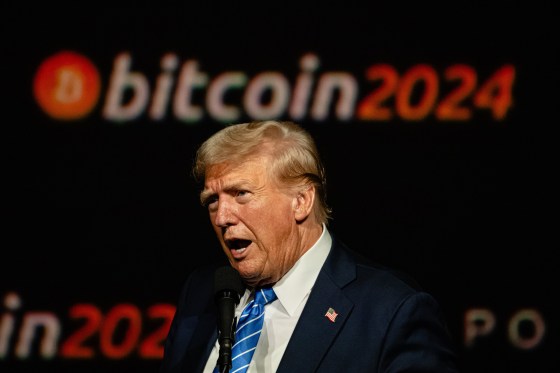
In keeping with his pledge to encourage the use of cryptocurrencies like bitcoin, President Donald Trump declared Thursday that his administration will consider the possibility of establishing a “national digital asset stockpile.”
His executive action did not, however, completely establish a strategic bitcoin reserve, as some cryptocurrency supporters had hoped.
The news caused a temporary spike in the price of bitcoin, but when traders assessed the move, it dropped back to its daily lows.
Although the concept of a strategic reserve of digital tokens, such as bitcoin, has been around for a while, it gained popularity this summer after Trump and Robert F. Kennedy Jr., Trump’s candidate for secretary of health and human services, spoke about it at the annual Bitcoin conference.
In a December interview with CNBC, Trump reiterated his plan to establish a reserve, saying that the US has a responsibility to lead the world in cryptocurrency technology, particularly in comparison to China.
A reserve should be established, according to proponents, who claim that bitcoin is the next “digital gold.” Proponents of cryptocurrency argue that the US should possess bitcoin in the same way that it owns gold reserves.
According to Yahoo News, Brian Armstrong, the CEO of the cryptocurrency company Coinbase, stated this week at the World Economic Forum in Davos, Switzerland, that he believes the world is heading toward a bitcoin standard for currency. As a reserve, bitcoin should be held by any nation that owns gold.
Sen. Cynthia Lummis, a longtime supporter of bitcoin and the chair of the Senate Banking Subcommittee on Digital Assets, issued a statement hours before Trump’s order on Thursday, urging the establishment of a strategic bitcoin reserve that would “strengthen the U.S. dollar” and preserve the country’s position as a financial innovator.
Trump actively courted the cryptocurrency community during his presidential campaign, and it ultimately turned out to be his biggest source of funding.
Along the way, he pledged to make the US “the crypto capital of the world,” and he made campaign-trail promises to lift prohibitions and limitations on cryptocurrency that Biden had put in place.
Trump’s intention to directly profit from pro-crypto policies was questioned shortly before he was elected. He introduced $TRUMP, his own digital token, on Friday. Despite the token’s lack of inherent value as a “memecoin,” investors quickly saw it as a way to monitor the Trump administration’s progress, which caused its price to spike. A significant portion of the cryptocurrency community, including former Trump supporters, criticized the releases as a way for them to profit from their views after first lady Melania Trump launched her own coin less than 48 hours later.
Trump is essentially in uncharted terrain when it comes to conflicts of interest. Although Vice President JD Vance reportedly held between $250,000 and $500,000 worth of bitcoin, it is unclear if he actually owns any.Shortly before taking office, Trump voluntarily published an ethics declaration stating that he would restrict his engagement in the Trump Organization during his time in government.
Trump also overturned a request from the Biden administration to investigate a U.S. digital currency, commonly referred to as a central bank digital currency, or CBDC, in his order on Thursday. Some governments around the world have adopted and studied these currencies, but others have treated them with suspicion and scrutiny due to privacy and monitoring issues.
By stating that CBDCs “threaten the stability of the financial system, individual privacy, and the sovereignty of the United States,” Trump’s order forbids the creation, issuance, and distribution of CBDCs.
